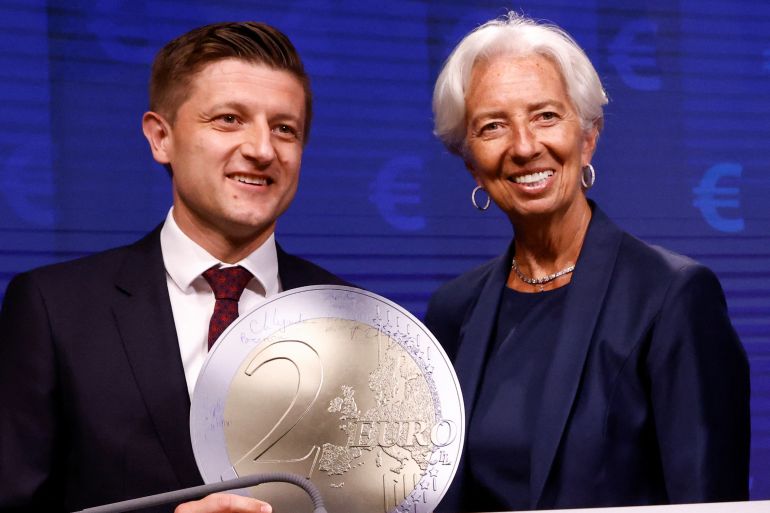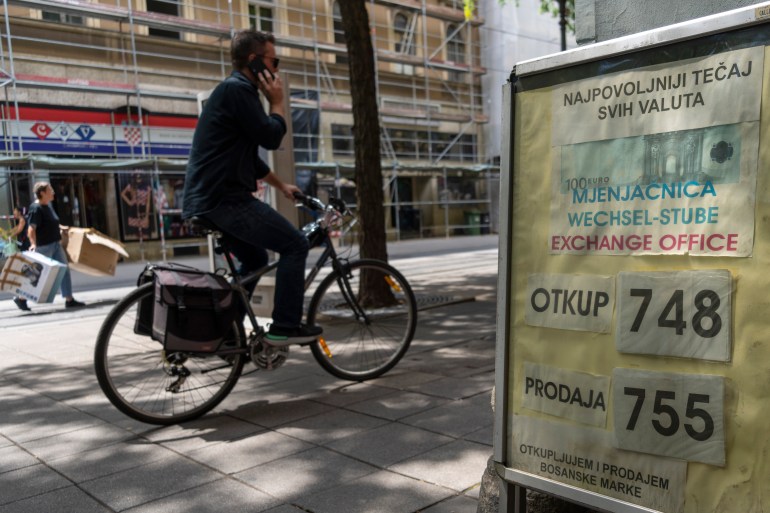EU gives Croatia final approval to adopt euro currency in 2023
Croatia will become the 20th country to join the eurozone on January 1, 2023.

European Union finance ministers have given Croatia the final approval to adopt the euro single currency on January 1, 2023, replacing the Croatian kuna.
“I would like to congratulate my counterpart, Zdravko Maric, and the whole of Croatia for becoming the 20th country to join the euro area,” Zbynek Stanjura, the finance minister of the Czech Republic, which holds the EU’s rotating presidency, said on Tuesday.
Keep reading
list of 1 itemIt is the first expansion of the currency bloc in almost eight years just as the euro has dropped to its lowest level against the US dollar in 20 years.
The previous EU country to join the European single-currency area was Lithuania in 2015.
The benefits
In the 27-nation EU, adopting the euro offers economic benefits stemming from deeper financial ties with the currency bloc’s other members and from the European Central Bank’s monetary authority.
The bank plans to raise interest rates for the first time in 11 years this month to tackle record inflation of 8.6 percent.
More tangibly, it means that any of the current eurozone’s 340 million inhabitants who visit Croatia will no longer need to exchange their cash for kuna.

Euro entry also has political rewards because the shared currency is Europe’s most ambitious project to integrate nations, giving them a place in the EU core. That means a seat at the EU’s top decision-making tables.
The changes come as the euro’s exchange rate very briefly touched $1 for the first time in 20 years on Tuesday before immediately recovering.
There are fears that a worsening energy crisis in Europe tied to Russia’s war in Ukraine could send the eurozone economy into a tailspin.
Seven previous enlargements
Created in 1999 among 11 countries, including Germany and France, the euro has gone through seven previous enlargements starting with Greece in 2001.
The appeal of euro membership is reflected by the last three expansions, which brought in Baltic states between 2011 and 2015.
During that period, the eurozone was scrambling to contain a debt crisis that Greece had triggered and that was threatening to break apart the currency alliance.
A combination of European emergency loans to five financially vulnerable member countries and an ECB pledge to do “whatever it takes” to save the euro enabled the currency bloc to weather the turbulence and emerge stronger.
Joining the euro requires a country to meet a set of economic conditions. These relate to low inflation, sound public finances, a stable exchange rate and limited borrowing costs.
Limited implications
Croatia is relatively small and poor, so its euro entry will have limited international economic implications.
The country has a population of about 4 million and per capita wealth that, at 13,460 euros ($13,500) last year, was less than half of the euro-area average.
Nonetheless, against the backdrop of the Russian war in Ukraine and Kyiv’s hasty application for EU membership, Croatia’s imminent adoption of the euro sends a potentially significant political signal.
Croatia was itself at war in the early 1990s during the violent break-up of Yugoslavia. The country applied for EU membership in 2003 and joined the bloc in 2013. That was the last time the EU expanded.
